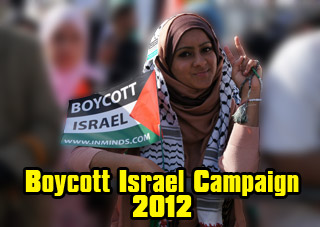
 Innovative Minds © 2014. All Rights Reserved. www.inminds.co.uk | ||||||||
Why we need an Academic Boycott of Israelinminds On February 8th 2011, Goldsmiths Palestine Campaign (Goldsmiths College University of London) with support from the British Committee for Universities in Palestine(BRICUP) organised a seminar on "Why we need an Academic Boycott of Israel". Speakers included:
Full video of the event is available below. Laura Hartley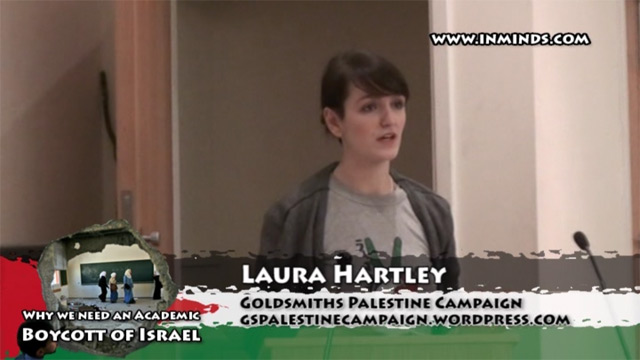 Laura Hartley, Goldsmiths Palestine Campaign Laura Hartley began by reading out the July 2004 call by Palestinian academics for an 'Academic and Cultural Boycott of Israel': CALL FOR ACADEMIC AND CULTURAL BOYCOTT OF ISRAELWhereas Israel's colonial oppression of the Palestinian people, which is based on Zionist ideology, comprises the following: * Denial of its responsibility for the Nakba -- in particular the waves of ethnic cleansing and dispossession that created the Palestinian refugee problem -- and therefore refusal to accept the inalienable rights of the refugees and displaced stipulated in and protected by international law; * Military occupation and colonization of the West Bank (including East Jerusalem) and Gaza since 1967, in violation of international law and UN resolutions; * The entrenched system of racial discrimination and segregation against the Palestinian citizens of Israel, which resembles the defunct apartheid system in South Africa; Since Israeli academic institutions (mostly state controlled) and the vast majority of Israeli intellectuals and academics have either contributed directly to maintaining, defending or otherwise justifying the above forms of oppression, or have been complicit in them through their silence, Given that all forms of international intervention have until now failed to force Israel to comply with international law or to end its repression of the Palestinians, which has manifested itself in many forms, including siege, indiscriminate killing, wanton destruction and the racist colonial wall, In view of the fact that people of conscience in the international community of scholars and intellectuals have historically shouldered the moral responsibility to fight injustice, as exemplified in their struggle to abolish apartheid in South Africa through diverse forms of boycott, Recognizing that the growing international boycott movement against Israel has expressed the need for a Palestinian frame of reference outlining guiding principles, In the spirit of international solidarity, moral consistency and resistance to injustice and oppression, We, Palestinian academics and intellectuals, call upon our colleagues in the international community to comprehensively and consistently boycott all Israeli academic and cultural institutions as a contribution to the struggle to end Israel's occupation, colonization and system of apartheid, by applying the following: 1. Refrain from participation in any form of academic and cultural cooperation, collaboration or joint projects with Israeli institutions; 2. Advocate a comprehensive boycott of Israeli institutions at the national and international levels, including suspension of all forms of funding and subsidies to these institutions; 3. Promote divestment and disinvestment from Israel by international academic institutions; 4. Work toward the condemnation of Israeli policies by pressing for resolutions to be adopted by academic, professional and cultural associations and organizations; 5. Support Palestinian academic and cultural institutions directly without requiring them to partner with Israeli counterparts as an explicit or implicit condition for such support. Endorsed by: Palestinian Federation of Unions of University Professors and Employees; Palestinian General Federation of Trade Unions; Palestinian NGO Network, West Bank; Teachers' Federation; Palestinian Writers' Federation; Palestinian League of Artists; Palestinian Journalists' Federation; General Union of Palestinian Women; Palestinian Lawyers' Association; and tens of other Palestinian federations, associations, and civil society organizations. 6 July 2004 Then she went on to shattered any myths of Israeli academia being bastions of academic freedom and equality, explaining that whilst in Israel Palestinian citizens make up approx. 20% of the population yet in Israeli universities non-Jews constitute only 9.5% of undergraduates, civil equalities group states that non-Jews are three times more likely to be rejected from a place in university than a Jewish candidate and that Palestinian Israeli academic staff in Israeli universities constitute around 1%. Mike Cushman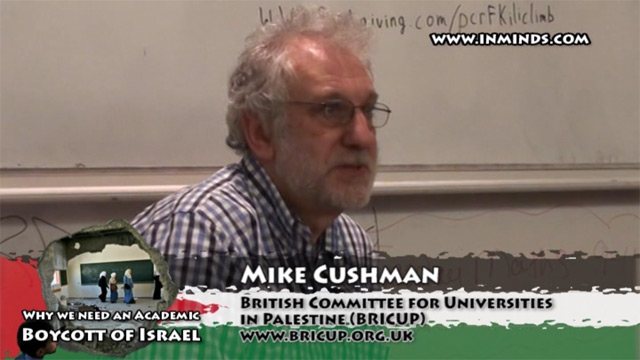 Mike Cushman, British Committee for Universities in Palestine (BRICUP) Kingston University collaborating with ElbitA quick browse by ourselves of the cordis database revealed that Kingston University in Surrey is currently in research partnership with Israeli arms firm Elbit which was recently found guilty of complicity in Israeli violations of international law by the Russell Tribunal on Palestine. The security related project costing over 21 million euros started in Sept 2010 and is scheduled to continue for 42 months, ending in Feb 2014.  Cordis search reveals Kingston University research project with Elbit The administrative contact for the project at Kingston University is given as Ms Bee-Lian Tang who is the Research, Enterprise and Marketing Support Officer for the Faculty of Computing, Information Systems and Mathematics, its research director is Prof Graeme Jones. Mike Cushman started by explaining, as a Jew, what the difference between a Jew, an Israeli, and a Zionist are. Then he asked "Why BDS?" and then answered that BDS is "mass non-violent civil society action, its the way that the citizens of the world can engage as individuals, as groups, in supporting the struggle for the Palestinian people". On the academic boycott he explained that Israeli universities are effectively the research and development arm of the Israeli military. They proudly proclaim their links with the military and with the security services. Tel Aviv university in its alumni and funders magazine gave page after page on how it supports the Israli military in their actions, in weapons development, in developments of strategy, in development of forms of interrogation, etc. Israeli universities provide customised training for the Israeli army, for the Shin-Bet, etc. They give privileged enrolment for members of the Israeli armed forces. Israeli universities are built on expropriated land, some like the Hebrew University in Jerusalem built on land stolen in 1967, other on land stolen in 1948. Mike Cushman explained that Israel is a militarised state, it has a citizen army - when people finish their national service they serve in the reserves. Universities are hierarchical places, and so are armies. So the professors in the universities on a Monday are doing their reserve service as the brigadiers and colonels next, the lecturers on a Tuesday are captains and lieutenants running checkpoints on the Tuesday and Wednesday,the students are also the privates - the brute force of the occupation. There is no separation. Mike Cushman explained how Israel got research funding from Europe: "The European research area (ERA) comprises of most of the countries in Europe and Israel. Its designed to foster research collaboration between universities in different countries and build up research capacity.. Israel is a major player in the ERA, it gets a lot of funding there.. it also gives Israel access to research done in Europe to help strengthen their occupation, to strengthen their economy." He asked the audience to go to the cordis research funding database and find out which of their teachers was collaborating with Israeli universities [see our search - box on right]. Mohammed Abuabdou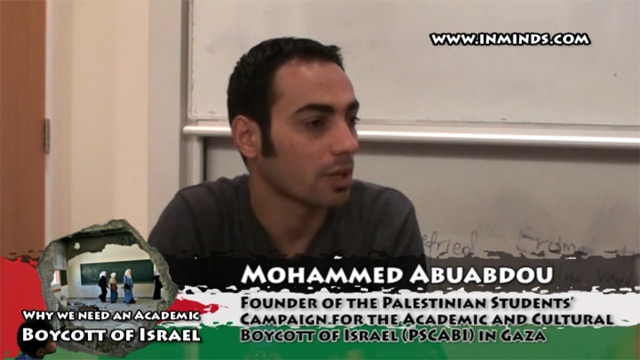 Mohammed Abuabdou, founder of the Palestinian Studentsâ Campaign for the Academic and Cultural Boycott of Israel (PSCABI) in Gaza Mohammed talked about aspects of the history of Palestinian civil struggle against the occupation from before the Nakba during the British mandate up to today, focusing more on recent campaigns like the academic and cultural boycott. He explained how, in its attack on Gaza, Israel had specifically targeted educational institutes like bombing most of the buildings on the campus of the Islamic University of Gaza, destroying the library of Al-Aqsa University, completely destroying the American School in north Gaza. Jody McIntyre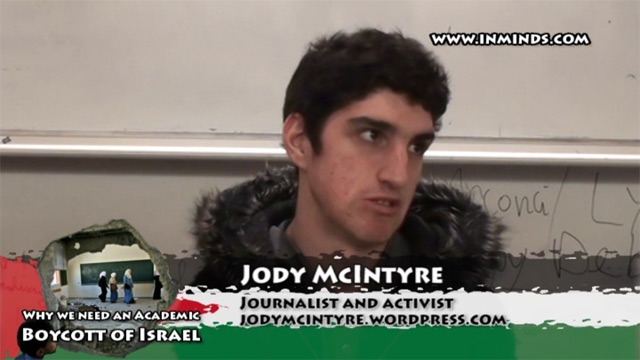 Jody McIntyre, journalist and activist Jody McIntyre's inspiring talk looked at the issue from the human perspective. Of how the occupation effects the lives of ordinary Palestinians, giving a personal eye-witness account of one student in particular whose family was thrown out of their home by Israeli soldiers three days before her exams. She revised for the exams homeless on the street opposite her house, which was now occupied by Jewish settlers. He ended his talk saying "this is not a level playing field, there is no equality between an Israeli person trying to get an education and a Palestinian person trying to get an education. Until young Palestinian people can get an education without the fear of having their home demolished or being evicted from their home or having family members arrested or injured or killed, until that happens, there must be an academic boycott". In the discussion section Mike Cushman revealed that the Israel army are now charging Palestinians money after demolishing their homes to pay for the demolition costs! He witnessed poor bedouins forced to demolish their own homes. Full Video of Seminar:Duration: 1h 29m 36s0:00:00 - Laura Hartley, Goldsmiths Palestine Campaign
Source: inminds.com Related ArticlesAlso Of InterestPage URL: http://www.inminds.com/article.php?id=10500
|
|
Support Us
If you agree with our work then please support us.Campaigns INMINDS Facebook Live Feed Latest Video's
INMINDS Twitter Feed Tweets by @InmindsComFeatured Video's
You need Flash player 8+ and JavaScript enabled to view this video.
[all videos (over 200)..] Featured MP3 Podcast  "The United States is 4.6% of the worlds people but still controls 50% of the worlds wealth and has a military that spends more than every other country in the world combined. I see this moment, as a moment that is very dangerous.. which is to say that the United States is a declining world economic power, similarly a declining political power, but what isn't declining is the military power. As you know from the 20th century that's a dangerous combination - a declining economic and political power but an overwhelmingly dominant military power. I think the national security state that we've seen organised since 9-11 in an unbelievably rapid way, which owes in no small part to Israel I must say, is a particular [example]." A founding member of the Weather Underground Meeting with members of 'Smash EDO' in Tel Aviv, April 2010 [88min / 40Mb] [all podcasts..] Newsletter Feedback |
 |
 |




























